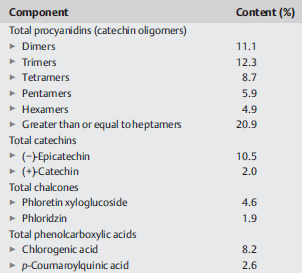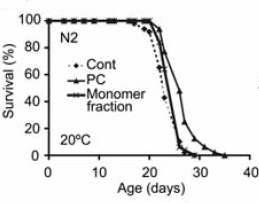|
Definition: "An ergogenic aid is any substance or phenomenon that enhances performance "
|
|
||||||||
23.12.2010 |
|
|
Apple polyphenols extend lifespan: but how they do so is a mystery
Polyphenols in apples extend the lifespan of the Caenorhabditis elegans roundworm by 12 percent. The effect is similar to that of resveratrol but the mechanism is different, according to the research department at the Asahi Breweries in Japan.
Resveratrol is found in miniscule quantities in red wine and peanuts. It's not possible to get enough resveratrol through food though, if it's noticeable effects you're after. The skin of red apples does contain larger quantities of polyphenols that are related to resveratrol, however. The composition is shown below. If these polyphenols work in the same way as resveratrol, then other possibilities open up. Certainly if you are a beer brewer who also processes large quantities of apples into cider.
The researchers gave their roundworms a food culture containing 65 microgram/ml procyanidins from apples [PC]. Procyanidins are complex phenols, made up of catechin molecules. Other roundworms were given food containing 65 microgram/ml resveratrol [Res] or 100 microgram/ml apple polyphenols [AP]. A control group was given no bio-active substances at all [Cont].
The researchers also extracted the monomer fraction out of their extract – catechins, chalcones and phenol carboxylic acids. These had no effect, as the figure above shows. So it's the complex procyanidins that do the work.
How these apple phenols extend life span the researchers don't know. The phenols had no effect on mutant roundworms that have a shorter life expectancy as a result of higher oxidation. So apparently it’s not an anti-oxidant mechanism at work.
In other mutant roundworms that do not produce sir-2, the phenols don't work either. So apple phenols do something to this enzyme. But in tests where the researchers look directly at SIRT1, the phenols have no effect, while in the same tests resveratrol does stimulate the longevity enzyme. Conclusion: resveratrol and apple phenols do the same thing but in different ways.
Hmm... What would happen if you combine apple phenols and resveratrol?
Source:
More:
|
|





